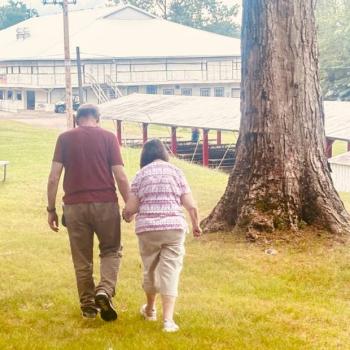God’s Profound Care – Known, Protected, and Provided For
Text: Jeremiah 1:4-10; Psalm 71:1-6, 9, 14-18; Matthew 6:25-34
Lectionary text for Proper 16, Season after Pentecost
Sermon for Miller’s Station United Methodist Church 8/24/25
Introduction: The Universal Longings
When we think about who God is and how God operates our lives, I want to invite you to consider God as intimately involved in our lives – God knows us, protects us, and provides for us, inviting us into a life of trust and purpose.
As a mental health therapist, I utilize principles of humanistic psychology, which emphasizes the significance of interpersonal connections in human well-being. People possess an inherent desire to be recognized and valued for their intrinsic qualities, rather than solely for their actions or achievements. Based on my clinical experience, the initial five years of life are crucial for developing trust and forming a sense of self. In cases where caregivers do not provide adequate recognition, foster positive meaning, or demonstrate acceptance, individuals may experience enduring mental health challenges. Furthermore, when societal understanding of concepts such as God diminishes, there can be associated implications for moral development and the perception of meaning.
We have a deep need for security, in a world of uncertainty, isn’t there a deep craving for safety, a rock to stand on when life feels shaky? In behavioral work, I learned that it is consistency that creates trust and a deep intimacy with those around us. God is a God that is always certain, always consistent. This alleviates our worry of provision: How often do we fret about tomorrow, about enough food, clothing, or financial stability?
In today’s passages, the Bible presents a God who profoundly addresses these very longings. Our passages today paint a beautiful picture of a God who is intimately involved in every facet of our lives. The theme of knowingness, protection and providence are all evident in today’s passages.
As we begin to consider to look at these passages, I have one more stage set for you consider. As we think about our relationship to God, I want you to consider it being a two way connection. God needs us as we need God. In this divine interaction, we find ourselves standing at the crossroads of divine invitation and human longing. This mutual connection—God’s desire for relationship as much as our yearning for meaning—invites us to listen more closely to the voice that calls us by name, sustains us in weakness, and assures us of a purpose that is both personal and cosmic. As we hold this tension between vulnerability and trust, we are reminded that the assurance of God’s presence is not abstract but deeply practical: it shapes our sense of identity, directs our responses to adversity, and grounds our hope in uncertain times. With this understanding, let us now explore how these ancient truths echo through Scripture and manifest in our everyday experience.
God Knows Us Intimately (Jeremiah 1:4-10)
Some of us here have been parents and some of us are lucky to be grandparents. Our mothers in the congregation know their children very intimately from the womb, often knowing their personalities before they were born. In verses 4-5, Jeremiah shares that God too knew us before we were. This divine pre knowledge underscores God’s intimate involvement in our creation, echoing the sentiments expressed in Psalm 139:13-16. This profound truth highlights God’s foreknowledge and God’s is unique plans for us even before we come into existence. knowing power,
How many of us have been in middle school or high school or even as a adults felt like we were not enough or that everything we do is wrong? God shows up and supports us despite our inadequacies. This divine affirmation and support for those God calls, emphasizes that it is not about personal ability but God’s presence and empowerment. We will never be enough, there is always someone smarter, younger, prettier or stronger than us. God though, like a good parent always shows up with open arms ready to guide us through our inadequacies. You are always enough with God.
From Jeremiah, we can take away the advice that our lives are not aimless. God knows us for a purpose, and God will empower us to live it out.
God Protects Us and Is Our Strength (Psalm 71:1-6, 9, 14-18)
I tell parents that if they do their job right the first 11 years of their child’s life, teenager-hood won’t be so bad. As parents, it our job to create a safe space for our children to learn and grow. When this established, as children grow into adolescence and they naturally become more independent, needing their parents less, home for children should be like home base in freeze tag, a safe space where no one can touch you and the child has a safe space to download their stressors and worries. The Psalms offer many examples of how God has set up a similar relationship and Psalm 71 today is a beautiful example.
When storms come, where do you run? God is an unchanging, unshakeable fortress, available to us at every age and stage.Think of our hymns and how many speak to God’s might? I remember my worship class in seminary and how we looked at theology through the lens of music, specifically the hymns. In my experience in monastic life, I found that chanting the psalms often left a deep impression on my soul that lasted until the next moment of corporate worship. To this day, I find having chant playing in the background a great way to ground myself when I am working.
I am drawn to several hymns, O God, Our Help in Ages Past, A Mighty Fortress is Our God, Great is Thy Faithfulness and Be Thou My Vision are all hymns that we can sing to remind us of God’s unwavering support in our lives. These hymns and the Psalms too all point to strength amidst adversity. These hymns often demonstrate that even when we feel weak, vulnerable, or inadequate, God’s strength is present in our weakness. Our praise becomes a testament to God’s enduring power. When we sing these songs corporately in our worship setting, we are demonstrating for those around us and to our communities that our experience of God’s protection and strength isn’t just for us; it’s a story to share, building faith in others.
God Provides for Us Faithfully (Matthew 6:25-34)
The Stoic philosopher and contemporary of Paul, Seneca in his thirteenth letter, titled “On groundless fears offers these thoughts on the futility of worry:
There are more things … likely to frighten us than there are to crush us; we suffer more often in imagination than in reality.
With an eye to the self-defeating and wearying human habit of bracing ourselves for imaginary disaster, Seneca counsels his young friend:
What I advise you to do is, not to be unhappy before the crisis comes; since it may be that the dangers before which you paled as if they were threatening you, will never come upon you; they certainly have not yet come.
Accordingly, some things torment us more than they ought; some torment us before they ought; and some torment us when they ought not to torment us at all. We are in the habit of exaggerating, or imagining, or anticipating, sorrow.
Worry burdens us without changing outcomes. It distracts us from the present and from trusting the One who holds our future. In our text from Mathew this morning, we hear the writer address worry. Here, we are encouraged to trust in God’s provision and to focus on spiritual priorities rather than material concerns. Today, we are enslaved by a 24-hour news and influencer cycle along with aggressive marketing for all sorts of products to make us more efficient and beautiful. In reality, none of that matters, the only thing that is changeless in our lives, is God. God always shows up, we on the other hand are going to get old, weak and eventually die. There is no magic formula, pill or 10 steps to a better x. When we learn the art of detachment, we live healthier and happier lives.
In the middle of our text from Mathew, we find that God’s creative power is matched by God’s sustaining care. Our value to Him far exceeds that of birds or flowers. God showers creation with lavish care. Providence is a core Wesleyan idea. Scripturally and theologically, providence is complex. The bible is full of stories of God’s providence. From Joseph’s experience in Egypt, Elijah being fed by ravens and Jesus calming the storms, the stories of both the Old and New Testament demonstrate the many ways God shows up.
God continually offers guidance, care, and love regardless of our perceptions of worthiness. Providence involves recognizing God’s ongoing support in all situations, though it can be difficult to discern during times of suffering or uncertainty.
Conclusion: Living in Light of God’s Care
Closing our message, I want to challenge us to learn how to live in light of God’s care. Here, we explored the three pillars of God’s care: knowing, protecting, and providing. These interconnected truths transform our lives from worry to worship, fear to faith, and aimlessness to purpose. It calls us to embrace their identity as deeply known and loved by God, seek refuge in God during anxious times, and prioritize God’s Commonwealth by trusting God with the future.
Our challenge then includes a call to prayer and commitment, to reflect on how external sources such as our hymns act as a reference that celebrate God’s unwavering support and strength, reinforcing the communal aspect of sharing faith and testimony.
Finally, I challenge you to embrace Your Identity:
Live today in the confidence that you are deeply known and loved by God, chosen to work with God for the purpose of being an integral part of building the kindom.
When anxieties rise, intentionally turn to God as your fortress and strength. Lean on God.
Prioritize God’s Commonwealth: Let go of worry about future provisions by faithfully seeking God’s will and righteousness today. Trust God with tomorrow.
May it be so











